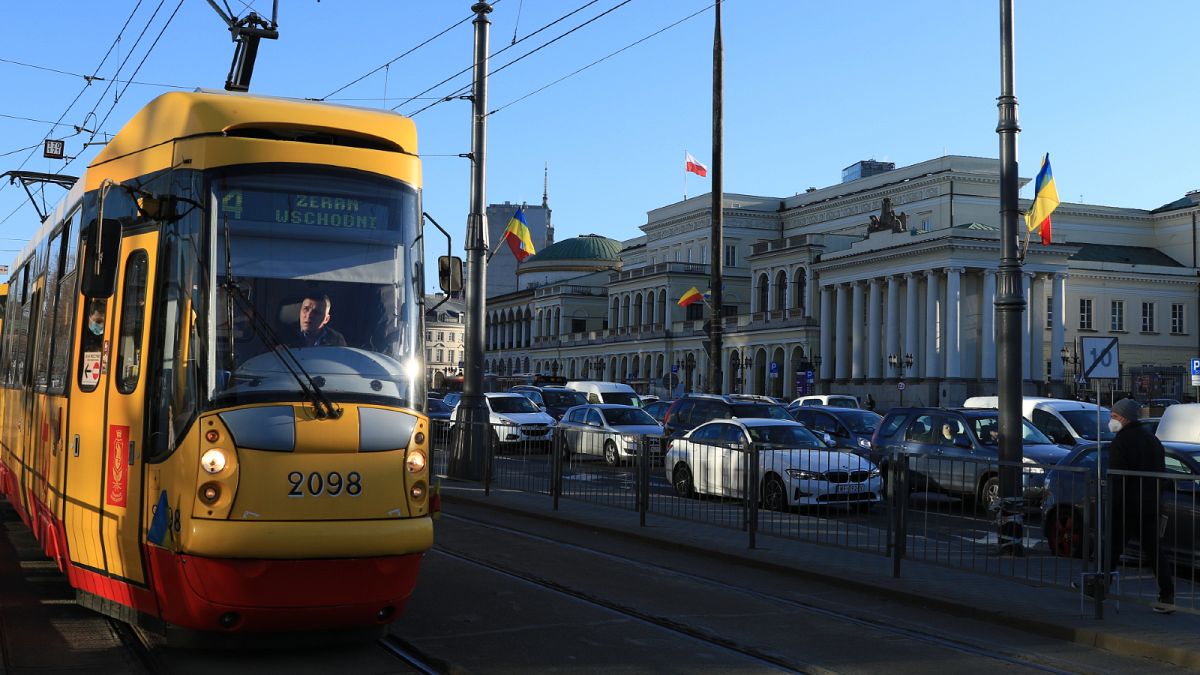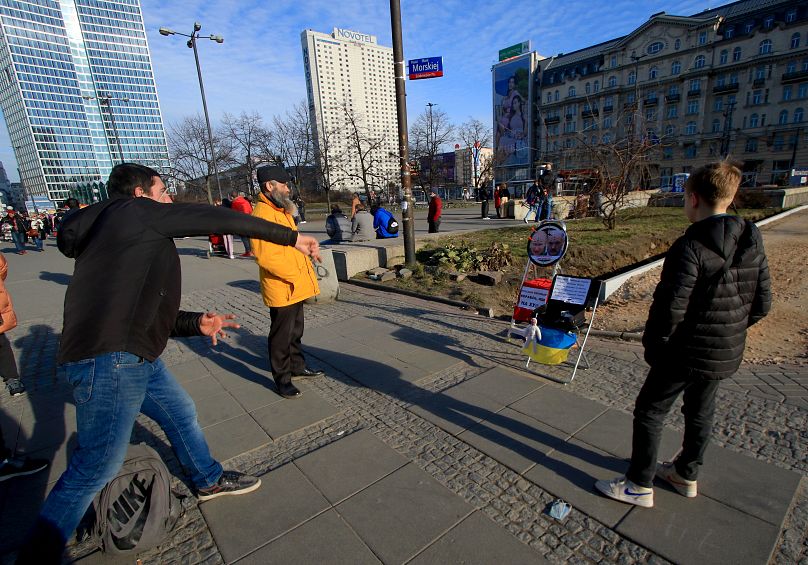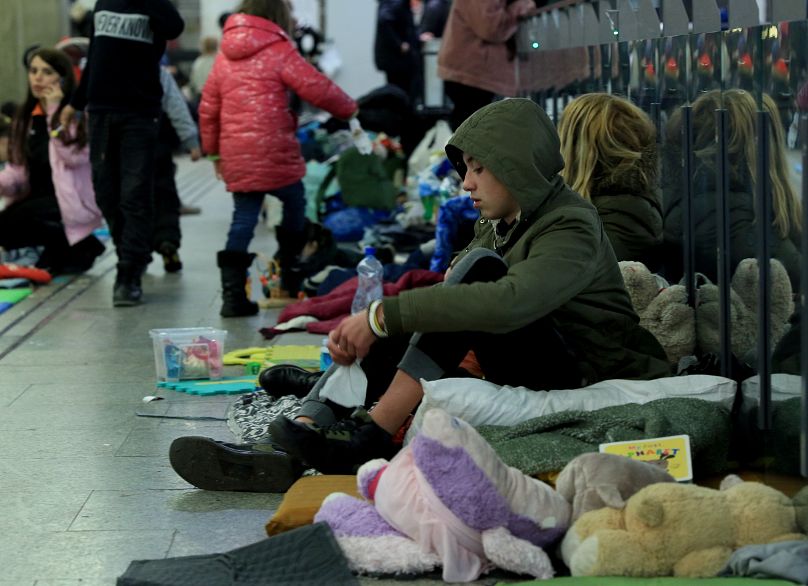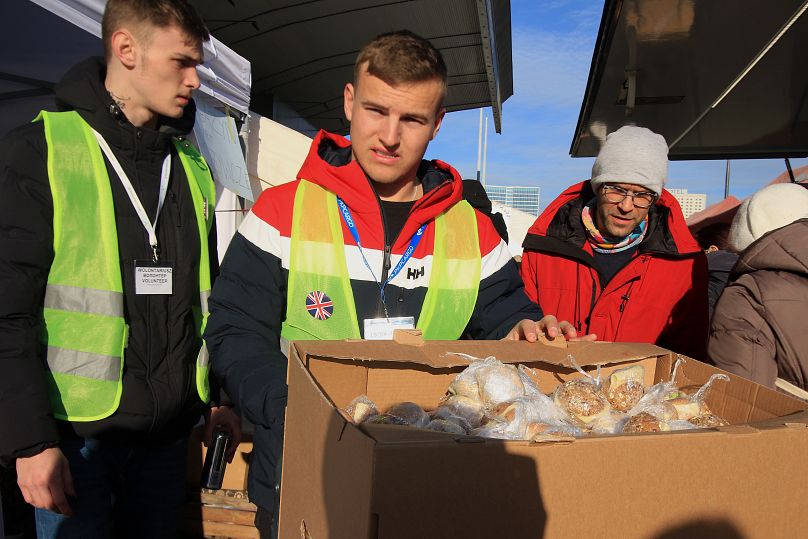“It is an amazing mobilisation that I’ve never seen before in my life. Everyone I know is in some way involved.”
Wherever the flag of Warsaw flies in the city, a Ukrainian one flutters alongside.
Government buildings, private apartments, buses and trams all over the Polish capital have raised Ukraine’s yellow-and-blue banner following Russia's invasion on 24 February.
It has also started appearing on Ukrainian-language billboards, on lapel pins worn by locals and in the windows of businesses raising funds to support Ukrainian refugees.
Not far from Warsaw’s Central Train Station, where volunteers have been working around the clock to provide refugees with necessities, residents can throw darts at the faces of Russian President Vladimir Putin and Belarusian leader Aleksander Lukashenko, in exchange for a donation to support Ukraine.
“Everything changed, truly,” said Krzysztof Mrozek, a think tank analyst-turned-volunteer translator assisting refugees at a support centre in downtown Warsaw run by Lewica, a left-leaning political party.
“This is an amazing mobilisation that I’ve never seen before in my life. Everyone I know is in some way involved.”
Poland has been the first destination of choice for more than half the three million refugees to have fled the country as of 15 March.
Over the course of nearly three weeks, Warsaw’s society and cityscape have been tangibly altered. Even as much of the world’s attention has been focused on relief efforts at Poland’s border with Ukraine, the arrival of thousands of refugees in the country’s capital has sparked an outpouring of support from city residents, businesses, and civic organisations that have been providing food, medical aid, emergency housing, and educational support to newly arrived families.
But according to volunteers and city officials, Warsaw’s ability to sustain this support is growing thin, and calls for longer-term solutions are mounting in the capital.
“Warsaw is a very good city, they accepted us well,” said Yulia, a woman who arrived in the Polish capital from the Ukrainian city of Poltava on the night of 8 March. “Everyone is helping, there’s a great atmosphere, a human one. Here they treat us like human beings.”
Yulia is one of up to 230,000 people from Ukraine who have made it to Warsaw so far, according to city officials. Many of them have travelled through one of the city’s train stations, where humanitarian organisations and regular citizens have set up food banks, COVID-19 vaccination clinics, and information points for arriving refugees.
Magda Góra, a mother volunteering at a food distribution site outside Warsaw’s Central Station, said she comes to lend a hand whenever her son is in school.
“On the one hand I’m proud of all of us, but on the other hand when I look at the refugees, I get very sad and sorry for them,” she said at her tent.
Arriving families have been spending nights on the floors of the city’s train stations, and in Warsaw Central Station, a designated recreation area has been set up for children.
The city’s mayor, Rafał Trzaskowski, has stated these families are waiting for trains to travel further into Europe, and are not living there permanently.
In order to meet the ever-growing need for shelter, Poles across Warsaw and the rest of the country have been hosting Ukrainian refugees in their homes over the last several weeks.
Agnieszka Czerederecka, a coordinator and member of the administration of the All-Poland Women’s Strike, said that in addition to distributing basic goods for refugees in Warsaw, her organisation has also recently rented a large house in a suburb of the capital for at least a year which will house up to thirty people.
“Until the war ends, individuals who will be looking for a safe place, it will be this house, permanently,” she said.
When she spoke to Euronews, Yulia was staying at a converted sports arena, one of 22 shelters the city of Warsaw has opened for refugees.
The municipal government has also integrated 2,800 Ukrainian children into schools and preschools, has opened up counselling centres, and raised food assistance funds.
Private businesses have joined in such efforts — currency exchanges have been exchanging Ukrainian hryvnias into Polish złoty without markup, and Google announced that its Warsaw campus would open itself up to NGOs providing refugees with legal and psychological help.
Small businesses have risen to the challenge as well. Katarzyna Kalinowska, a member of the administration of the grocery store cooperative Dobrze, which operates two stores in Warsaw and includes 350 members. Kalinowska said the cooperative and its members have been leading food donation drives for refugees and drivers delivering aid, selling food items to refugees at a discounted rate, and more. She said one member has offered to provide refugees with free massages.
“What’s strongly felt is that everyone is trying to do something however they can,” she said.
Nevertheless, officials and residents alike fear that as the months go by, this sort of public enthusiasm may start to fizzle out.
Konstantyn Radziwill, the voivode of the Mazovian Voivodeship in which Warsaw is located, told Euronews at a press conference that the Polish economy is geared to integrate “an enormous number of people,” but Trzaskowski has called for a more systemic response to the refugee influx.
On 11 March, he called for international assistance for Poland in order to deal with successive waves of immigration from Ukraine.
Nevertheless, Czerederecka remains sceptical about such measures.
“On the government, I am not counting on them, and none of us are counting on them,” Czerederecka said. “Is the city ready? No city is ready for this amount of refugees. I hope Warsaw will be able to handle it.”



